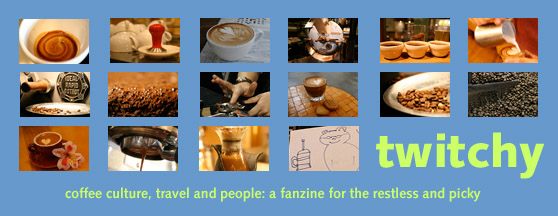Let’s be clear. I know all about lazy journalism. As a journalist for more than a decade, as well as a book author and publisher, I have been on both sides of lazy journalism many, many times. Someone needs a quote from me this afternoon because they kinda spaced on their deadline? Sure, I understand. I have sent those last-minute emails, too. I understand it can be hard some days to shove the cat off the couch and get down to brass tacks, meet your deadlines, and even, in some cases, do a good job on your researching and reporting. I have empathy. I do.
That said, I work extremely hard for very little pay in an industry—cultural journalism—that’s surviving on diminishing returns. A lot of people get paid poorly, and a lot of people—their choice, though it devalues the work of all of us—are willing to write for free. I do a good job delivering my own expertise on coffee (or tea, or whatever else I’m writing about) in articulate and informed articles that are, hopefully, accessible to a broad audience. I do this because I’m good at it and it’s an honorable job. Most of the time it even makes me happy.
But you know what doesn’t make me happy? Lazy journalists who take others’ hard work.
This Tuesday, Zagat, a one-time mom-and-pop company owned by Google.com since 2011, published a guide entitled “8 Hottest Coffee Shops in NYC“. Well that sounds great—I love coffee shops in NYC! The article made the rounds of my friends’ social media accounts and I was happy to see some of these great shops get a little more recognition.
And then I read the words, and some of them were mine.
An editor for Zagat named Kelly Dobkin has put her name at the top of this piece. Kelly Dobkin seems to live here in New York, and she also seems to pay frequent visits to a website that I write for, Sprudge.com, in her quest for primary sources for research and inspiration. That’s no problem. Except when it is. (Apparently, this isn’t the first time even this month that Dobkin’s been called out for cribbing from others.)
Dobkin included several cafes on her “8 Hottest” list that I have written about on Sprudge in the last few months. Here are some excerpts from my articles, compared with Dobkin’s capsule reviews on the Zagat site:
Budin Coffee (from my article on Sprudge.com, 17 Feb 2014)
Liz Clayton:
“The project of partners Elliot Rayman (a veteran of both Stumptown Coffee Roasters and bustling local Variety Coffee), Crystal Pei and Rut Hermannsdóttir, Budin’s realized dream, earlier profiled in these pages, is a modern cafe with a subtitle: “Coffee Bar. Design Goods. Nordic.” And if ever Greenpoint was ready for a high-end lifestyle-and-coffee shop…hopefully that time is now.”Kelly Dobkin:
“Why it’s hot: This Scandinavian coffee-bar-meets-lifestyle-shop in Greenpoint recently opened from Elliot Rayman (Stumptown Coffee Roasters, Variety Coffee vet), Crystal Pei and Rut Hermannsdóttir. Its tagline: “Coffee Bar. Design Goods. Nordic.” “
Hey, she moved the word “veteran” further down the line when she pasted in the copy! Good journalism, Dobkin! Dobkin also references the Modbar brewing system’s “flamed birch” handles, a detail in my article for which the owners had to text the company and specifically ask about on my behalf, while I stood in the cafe and waited. Happy to do the legwork there for ya, Kelly.
Here’s another:
Pushcart Coffee (from my article on Sprudge.com, 5 Feb 2014)
Liz Clayton:
“Pushcart baristas will be happy to dust off a Chemex, Clever Dripper, French Press, V60, Kalita Wave, or Aeropress to suit your fancy.”Kelly Dobkin:
“Personal barista service will make your brew via Chemex, Klever Dripper, French press, V60, Kalita Wave or Aeropress.”
I realize there are only so many ways to list all these coffee brewers, but copying and pasting them directly–while introducing the fascinating typo of spelling the Clever Dripper with a K–is really very lazy and really very obvious.
Here’s another yet:
Little Collins (from my article on Sprudge.com, 25 Oct 2013)
Liz Clayton:
“under-counter Modbar brewers (specifically the pourover, espresso and steam modules) and, despite the space’s close quarters and limited seating, serve quality food…”Kelly Dobkin:
“Under-counter Modbar brewers feature pour-over, steam and espresso-making options, which save space in the spot’s limited real estate.”
And here’s the thing: when lazy, hack journos like Dobkin start dragging and dropping other people’s well-researched, in-person-investigated copy, into their “own” work, things can get goofy. Dobkin’s recapitulation of the Modbar brewing system is so hasty that it doesn’t quite make sense anymore. (Sprudge has written about the system previously, and I go into more detail about it in my article—the way Dobkin attempts to slightly rearrange my words to make them her own now make it read like you can order a cup of steam from the baristas at Little Collins!)
Now, backing up a bit—this kind of thing is nothing new, and I’m aware people have been ripping each other off since time immemorial. It’s not always intentional, either—particularly in niche categories, a bit of repetition and imitation is inevitable. When you’re distilling the essence of a trendy cafe, there are often not a lot of different ways to say a place
has a reclaimed barn-wood bar, terrazzo flooring, a La Marzocco espresso machine and a pour-over bar, and free wi-fi. I get that. And when you’re writing a guide, as I often do, or capsule reviews for a coffee-finding app, which I also often do, there’s going to be a lot of overlap from one description to another. Guides, published on the internet, may simultaneously arise which cover some of the same territory as one another, or smartphone apps, like the one I mentioned, may have close kin who cover the same ground. This isn’t always comfortable for those of us who write the content, but we are aware that it happens—c’est la guerre.
That said, overlaps can also happen during research. When I write, for instance, a very basic article on the history of the MokaPot, a popular coffee brewer, I am going to read various existing sources to glean essential information. I am going to look at, and take information from, to rattle off a few, the Wikipedia article, a piece on DearCoffeeILoveYou, the New York Times, and the manufacturer’s own website. There are going to be bits and bobs of the same information in each piece—the name of the guy who designed it, Luigi diPonti, the names of the museums in which the MokaPot/Moka Express is on view, the story about the mechanics being inspired by a dishwasher. I take pains, when I use a variety of research sources, to both corroborate facts and not duplicate the way in which they are written. Why? Because my job as a writer is to write things—that’s wherein the pleasure lies.
Coffee writing is a funny thing. Writing, and journalism of every kind, are suffering qualitatively at the hands of the easy-to-access internet, which in myriad other ways has been a wonderful thing for the dissemination of information and the satisfaction of knowledge-seekers. But as publishing’s become easy, words have become cheap, and frankly, anyone can write a blog post (look at me, here on my soapbox!) or cut and paste something someone in a more remote nook of the internet inadvertently researched for them, and still bring home their Google paycheck…but I digress.
At the same time journalism’s teetering, coffee, and a wider interest in it, is on the rise. Higher quality coffee, better sourced, better prepared coffee exists now than ever has before, and an ever-growing number of people want to know about how to find it, brew it, and drink it. As those of us who really care try to get the information to the people—out of our own passion as well as some vague fantasy of career sustainability, it’s in the best interest of all of us to support a culture of journalism that works together to get good information about good coffee, coffee shops doing a good job, companies that source sustainably, the whole shebang—out to a wider audience. And by together I mean, not combatively, competitively, or through out and out theft.
It’s actually great that people like Zagat and other mainstream media are taking note of good coffee, and good coffee writing, but—in the tradition of big guys ripping off little guys—it’s not okay that bullshit practices like this slip past unnoticed. While Dobkin spends her GoogleBuck$ (I’m not saying she gets a lot of them, but neither I, nor my editors at Sprudge, saw so much as cheap as a link back for the work that we produced and published), I’ll be out in the city actually going to coffee shops, actually drinking the coffee, writing my own words in my own language and actually knowing, most of the time, what the heck I’m even talking about.
For shame, Dobkin, for being so brazenly lazy, and to her superiors at Zagat/Google for continuing to tolerate it even when she’s already been called out mere weeks ago. Of course, they probably don’t know…which is why I’m spelling it out here, in plain language.
Now if you’ll excuse me, I’m going to go drink some of New York’s hottest coffee.


February 28th, 2014 - 22:02
Wow. This SUCKS. I knew Zagat’s “journalism” was hack and lazy to begin with, but this is ridiculous to the nth degree.
February 28th, 2014 - 22:13
This is a very well-written and thought-out post about something that’s incredibly frustrating to see. With little pay, sometimes all an author like this has are their words, and when they’re stolen, that sucks. I hope the subsequent conversation that happens after this goes round the world helps to eliminate this from happening again at least one less. Cheers to you for all your hard work.